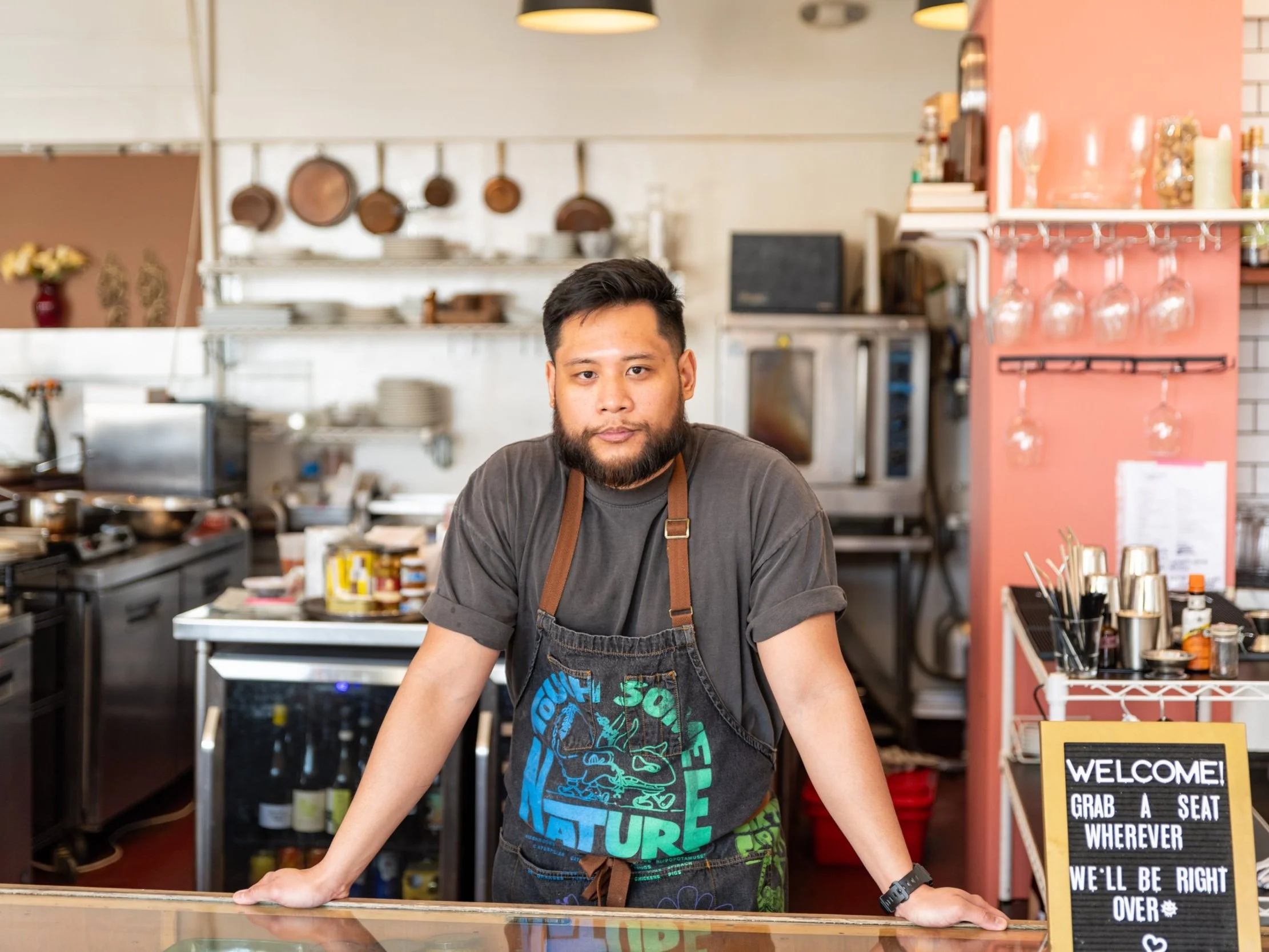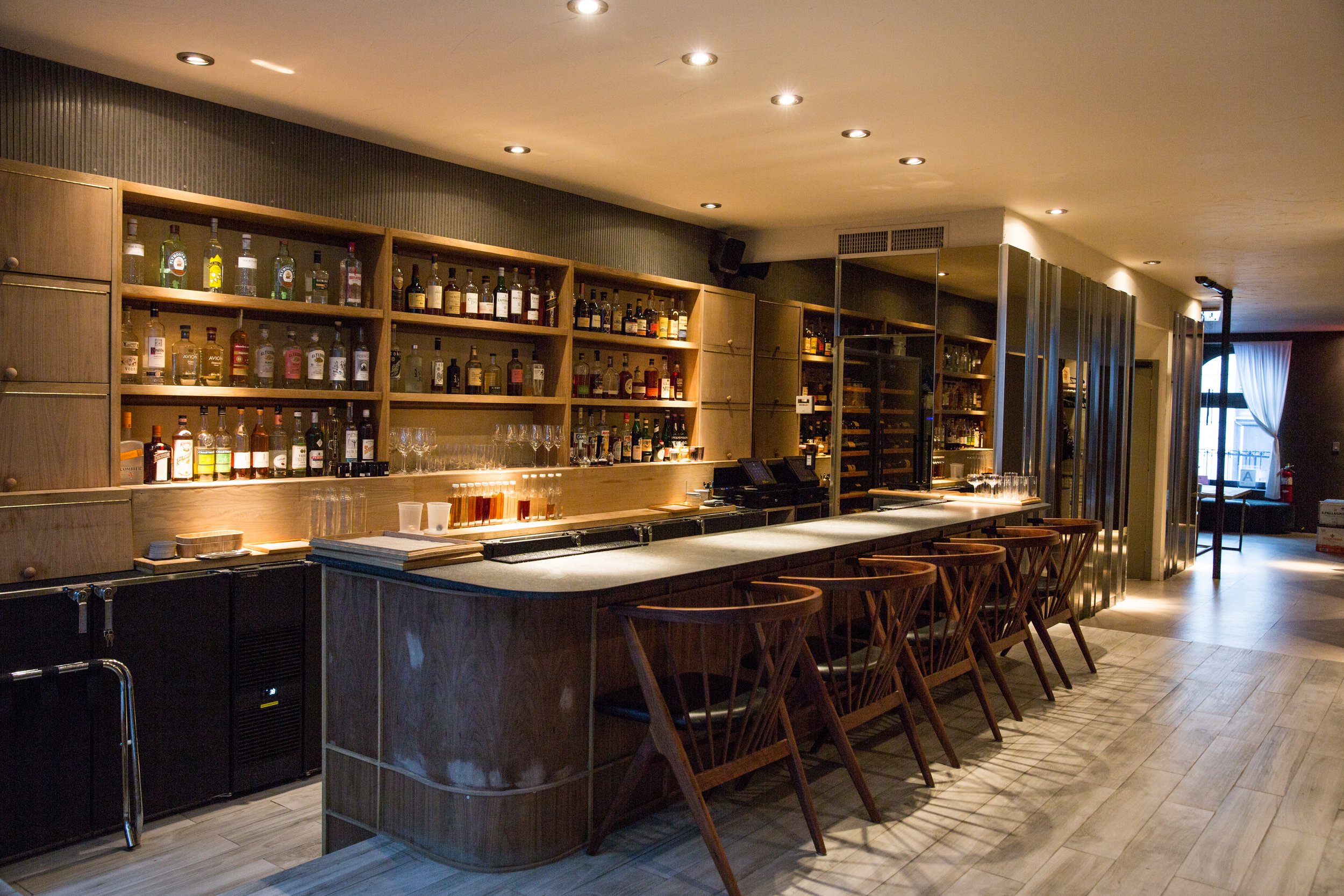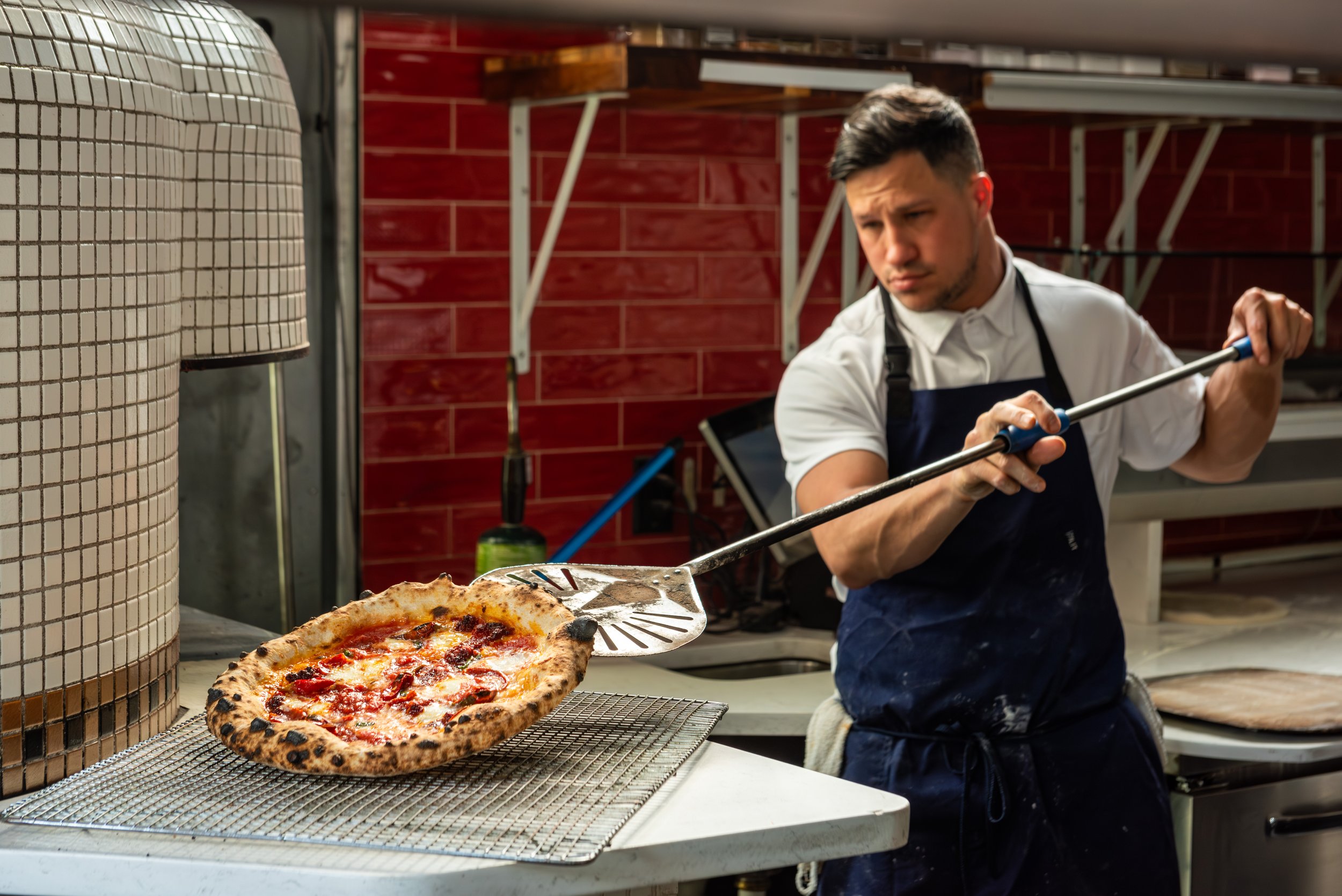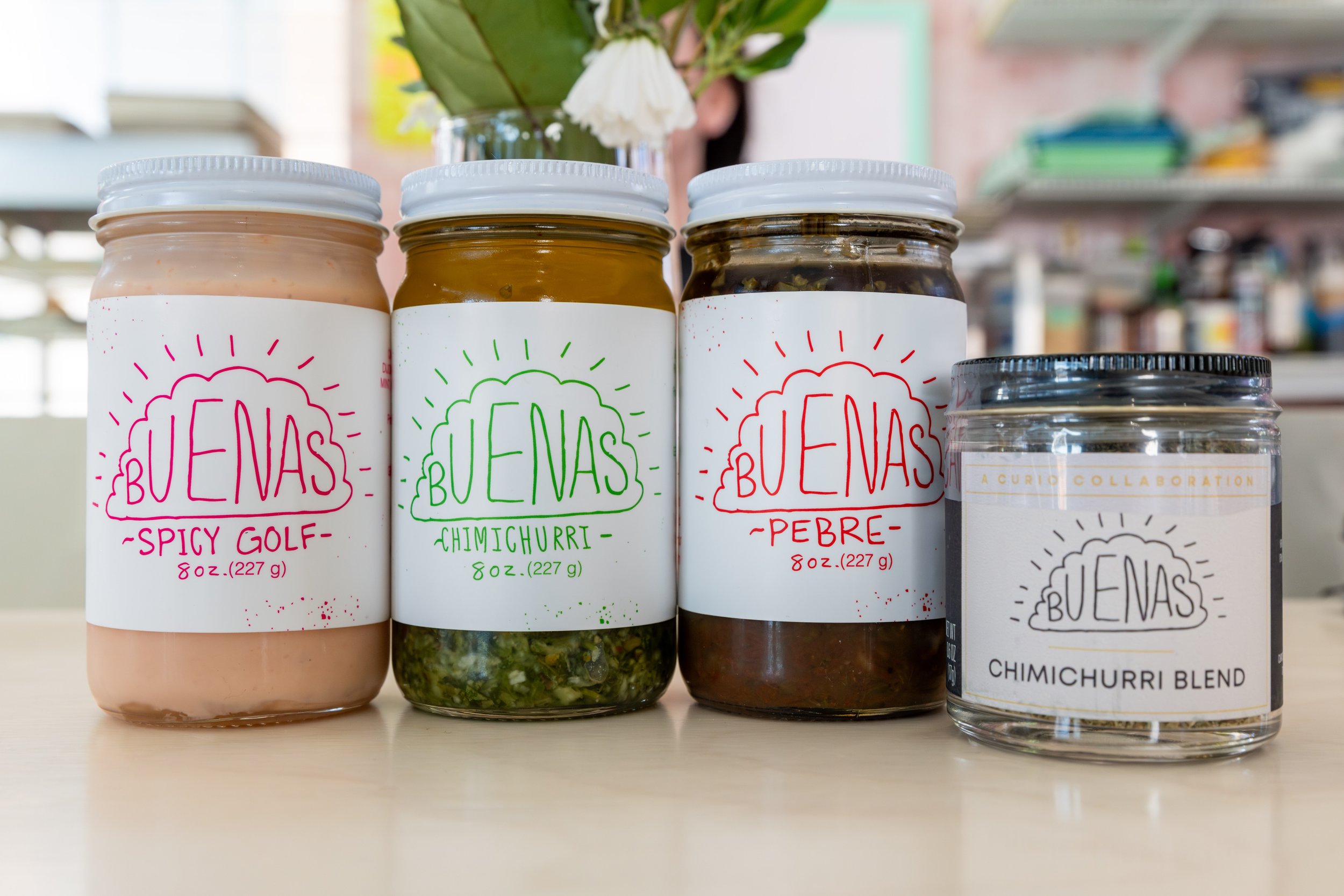Backroads and Roundabouts
Boston chef-owners are developing new concepts by sidestepping tradition.
Traditionally, Boston’s dining scene has been driven by long-standing restaurants in established neighborhoods—think the North End, Back Bay, South End, Harvard Square—and new offerings from respected restaurant groups. But, in a market where rents are through the roof and the very notion of going out has been turned on its head following the pandemic, a new generation of Boston area chefs are redrawing the roadmap to restaurant ownership. And diners are eating up the rewards.
The concentration of exciting new restaurants has spread outwards to Cambridge, Somerville, Dorchester, Quincy, and beyond as chefs are using food halls, residencies, and second-generation restaurant spaces to bring new concepts to life. As they sidestep more traditional brick-and-mortar-operations, and the investors needed to make that happen, chefs are forging independent routes that allow for more creative exploration.
Marketplaces like Bow Market in Somerville’s Union Square neighborhood are helping make that a reality. When the market, which hosts independent food and retail businesses, opened six years ago in a vacant garage, it tapped into a burgeoning interest in pop-ups. Co-owners Zach Baum and Matthew Boyes-Watson say that before opening, the market received more than 300 applications for the 30 available spaces, largely because it offered entrepreneurs the chance to open a food business for a startup investment of between $10,000 and $30,000, versus $100,000 (or more) for a traditional space.
Chef Jeff Almendras of Johnny Boy
Fried Chicken Adobo Sandwich, Atchara, Pandesal
“Essentially, it was orders of magnitude less expensive than what else you could find,” says Boyes-Watson. “There was this really experienced entrepreneurship community that had been artificially held off Main Street by the prohibitively high cost of getting started.” Beyond the low startup cost, he says another selling point for the market then and now is Union Square. "Bow Market would not exist in its current form if we were in a different part of the city." The market was designed to fit within the neighborhood, driven by an ecosystem of successful independent businesses, like Rebel Rebel and Remnant Brewing, that both anchor the community and provide mentorship for new restaurants.
One of these newer businesses is Chef Jeff Almendras’ Johnny Boy. A former data analyst who had also worked in restaurants, Almendras found during COVID lockdown that he missed the Filipino breakfasts he ate while growing up in Everett and Chelsea. So, he began working on his own version of a Filipino breakfast sandwich. As he shared photos of the sandwich on social media, he caught the eye of the owners of Tanám, the late, much-loved Filipino restaurant that was one of Bow Market’s early successes. They invited Almendras to do a breakfast pop-up.
“I pulled up early on a Sunday morning and saw there were already a ton of people there. I wasn’t expecting it,” he remembers.
Soon, he was ready for a new, more permanent home, but he resisted the route of “going all-in” on a restaurant space. “It was a huge financial risk I wasn’t willing to take,” he says. Luckily, he found Juliet Social Club, the wine bar and gathering space next to Juliet Restaurant in Union Square. Almendras now operates Johnny Boy in the Juliet Social Club space before it switches over to evening wine and snacks.
“I’m running my own business within another business. It’s a blessing,” he says. “I have the freedom to run my business as if the space was completely my own.”
Independence and access to an existing space is also what attracted Chef Valentine Howell to connect with an established restaurant for a residency at Vee Vee, a Jamaica Plain dining mainstay for 16 years.
The arrangement came about by chance. Vee Vee owners Kristen and Dan Valachovic were looking for a chef to take over the restaurant temporarily. As it turned out, Howell and his fiancé had been working on translating their Black Cat Tacos pop-up into a permanent restaurant.
“This felt right for us to do. We were going about the normal ways of getting a restaurant started—creating a business plan, looking for investors, saving money. But that can be a long, lonely road if you don’t have the right connections,” Howell says. Overall, he believes the benefits of a residency are many, and the downsides virtually nonexistent. “Having a space to call our own, getting to reach a whole new customer base, putting Black Cat on the map. This is big for us.”
Chicken Birria Tacos, Salsa Rosada, Queso Oaxaca, Lime, Corn Tortilla, Cilantro, Consomme
chef valentine howell of black cat eatery
As the opening approaches, Howell wonders how Vee Vee regulars will feel about the changes to the neighborhood restaurant. It’s a concern shared by others, like Chefs Peter Nguyen of Lê Madeline and Laurence Louie of Rubato, both of whom opened new restaurants in Quincy in spaces occupied by long-standing, more traditional neighborhood restaurants.
Opening a modern Hong Kong-style cafe outside of Boston was not part of the plan for Louie, until he received an offer he couldn’t pass up—from his mother. Louie was working as a chef in London and creating a business plan for an upscale Cantonese restaurant before COVID hit and investor interest ground to a halt.
At the same time, Louie’s mother decided to retire from operating Contempo, the Cantonese bakery she had run in Quincy for 22 years. She asked if he was interested in taking over the lease.
“Maybe we don’t need 100 seats and a $2 million build-out,” Louie recalls. From the business perspective, taking over his mother’s bakery space made sense. The rent was good. The building had a good skeleton. And most importantly, the potential for making a profit was there. The stretch of Hancock Street between Walnut Street and Elm Avenue in Quincy has essentially become Greater Boston's second Chinatown. Since 2002, people of Asian origin account for almost 30% of Quincy’s population, with many new Asian businesses and outposts of Chinatown restaurants located there.
While Louie felt that Quincy, with a lively and growing restaurant scene, was a good location for his cafe, he still wondered if the neighborhood would show up. Louie’s menu, a combination of more traditional options (like bao and congee) and modern takes on popular dishes (like his bolo bao sandwiches and lava french toast) sought to bridge the gap between locals and newcomers. The menu was a success, and Rubato sold out within two hours on opening day.
Like Louie, Chef-Owner Nguyen found challenges in replacing an existing Quincy pho restaurant owned by his partner’s family. They wanted to “create something that makes our family and ancestors proud,” but wondered if the neighborhood was ready to embrace change.
Working as a chef in Houston, Nguyen experienced a variety of Vietnamese restaurants that go well beyond pho and rice plates. This helped inspire his vision for Lê Madeline: Vietnamese cuisine with a Southern twist. “During the day it's more traditional, hoisin and sriracha on the tables. At night, [we] lower the lights. I want you to sit down, have a drink, and enjoy a chef-driven experience. We want to please everyone. This is something you might get in Boston, but might not expect in Quincy,” Nguyen says.
Nutthachai “Jeep” Chaojaroenpong also discovered the realities of taking over an existing neighborhood business—and its tiny kitchen—when he launched BoonNoon Market in Arlington. When he and his partners found the small space in 2022, the goal was to open a small grocery store to sell the Thai products they had trouble finding in the U.S. But when they saw the small kitchen—the remnants of a Thai restaurant that had been around for 20 years— Chaojaroenpong decided to offer traditional Thai dishes too. BoonNoon has succeeded with its updated menu and has become a neighborhood hotspot over the past few years.
Chef Nutthachai “Jeep” Chaojaroenpong of BoonNoon Market
Baker Marissa Ferola of Nine Winters Bakery
Finding a greater variety of creative options close to home seems to sit well with post-pandemic diners, many of whom are still working from home and are resistant to add commute time to their schedules, even for a night out.
Boyes-Watson says they have seen “quarter mile” customers who are coming from the neighborhood, but they have also seen people coming from a wider area who are attracted to the neighborhood’s strong dining, retail, and entertainment options. “I would say that people are creatures of habit. The habits were broken, and now they're reforming,” he says.
While new options such as pop-ups and market spaces provide opportunities for entering the market, booming business itself can be a problem, as experienced by Baker Marissa Ferola of Nine Winters Bakery and Chef Dan Spinale of Pizza Project.
Ferola began her baking career at Union Square Donuts. When it came time to launch her own concept for a Korean-American bakery, Ferola found that a pop-up space at Bow Market offered her the freedom she needed, and few barriers to getting started. “You can test your own limits and test your market to see what lands,” she says.
Her innovative bakes have met commercial success, but have led Ferola to take a step back from having a storefront at the market. Her advice to others is to grow slowly. “I wish I knew there was such a thing as growing too fast. When you’re a chef with a dream, you don’t think of that.”
Spinale and his wife Allie began Pizza Project in 2021 with a couple of propane-fueled pizza ovens that they took to pop up at breweries. As their business grew, they added a wood-fired trailer and finally landed in a permanent space at the Charles River Speedway in Brighton. “Having a space was always the goal,” he says.
But even their larger home comes with limitations, including no walk-in. Each day, Spinale prepares dough at an off-site production kitchen and brings it to the Speedway. At the end of the night’s service, it’s back to the production facility to wash up pans and other equipment. But, he believes that being part of a community and reasonable rent make a food hall a “great way to get started.”
In Boston, and beyond, the path to success is not as rigid as it once was. Chefs are getting creative and learning to pivot when the road to opening hits a dead end. Thanks to the support of local entrepreneurs, veteran restaurant owners, and even family members, there are real opportunities for new concepts to grow in spite of the ever-increasing economic constraints. Diners are happy to meet these chefs halfway, and they are proving with their spending power that this post-pandemic dining shift is here to stay.












